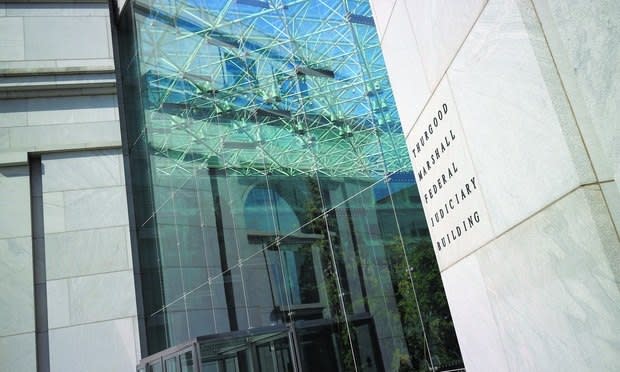Federal Judiciary's Proposals for Addressing Sexual Misconduct to Get Public Airing

Thurgood Marshall Federal Judiciary Building in Washington, D.C. Photo by Diego M. Radzinschi/ALM
The federal judiciary's proposals to deal with sexual harassment and related misconduct within the federal court system will undergo public scrutiny during a daylong hearing Tuesday.
Two committees of the Judicial Conference of the United States—Codes of Conduct and Judicial Conduct and Disability—will conduct the hearing on proposed amendments to the code and rules that respond to recommendations made in a June report by the Federal Judiciary Workplace Conduct Working Group. The hearing will be livestreamed beginning at 9 a.m.
The roster of witnesses includes, among others: Jaime Santos of Goodwin Proctor and Kendall Turner of Jenner & Block, co-founders of Law Clerks for Workplace Accountability; Chief Judge Lawrence O'Neill of the U.S. District Court for the Eastern District of California; Chief Judge Julie Robinson of the U.S. District Court for the District of Kansas; Charles Geyh of Indiana University Maurer School of Law; Arthur Hellman of the University of Pittsburgh School of Law; Renee Knake of the University of Houston Law Center; Carol Needham of St. Louis University School of Law; and a group of Yale Law School students.
The Federal Judiciary Workplace working group was established at the direction of Chief Justice John Roberts Jr. last December. The impetus for the group was the widely publicized sexual harassment allegations against former Judge Alex Kozinski of the U.S. Court of Appeals for the Ninth Circuit. Kozinski resigned in December amid those allegations of harassment against female law clerks.
Roberts directed the working group to consider whether changes were needed to the Judiciary’s codes of conduct; its guidance to employees on issues of confidentiality and reporting of instances of misconduct; its educational programs; and its rules for investigating and processing misconduct complaints.
The two Judicial Conference committees are accepting comments on the proposed amendments until Nov. 13.
Read more:
The #MeToo Backlash Is Building
Federal Judicial Misconduct Rules Could Get a Significant Makeover
Ethics Allegations Against Brett Kavanaugh Face Hurdles
Foley & Lardner Suffers ‘Cyber Event,’ Says Data Safe, As Law Firms Remain Targets



